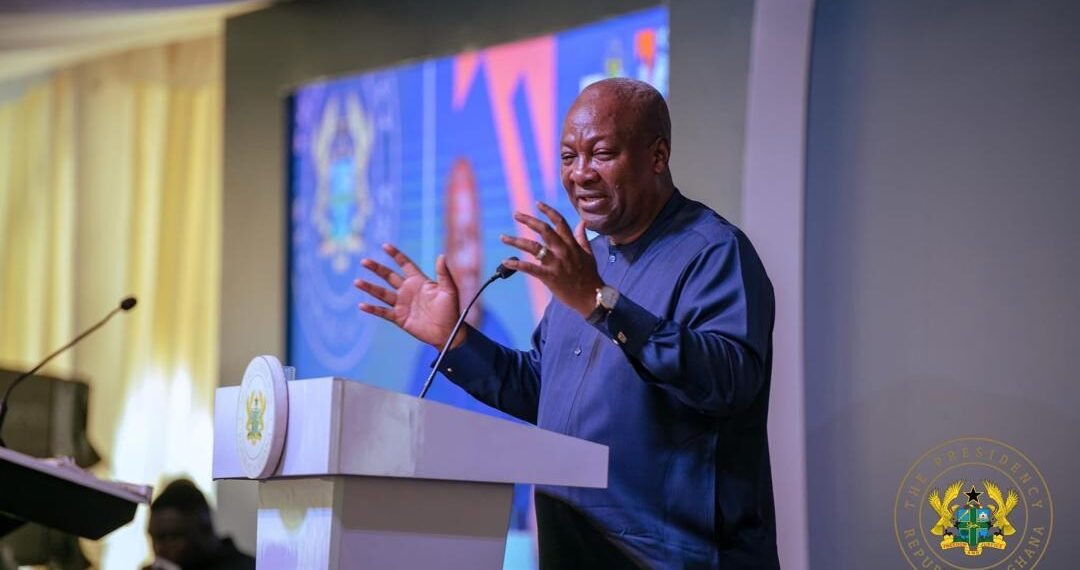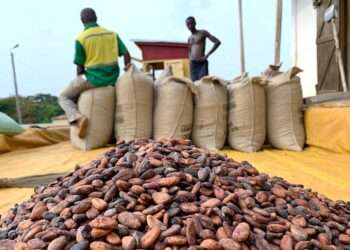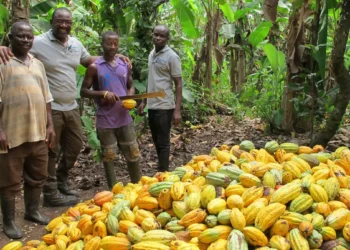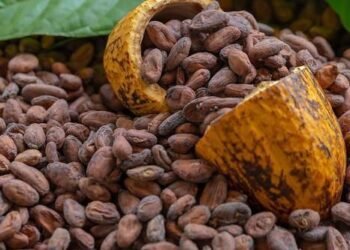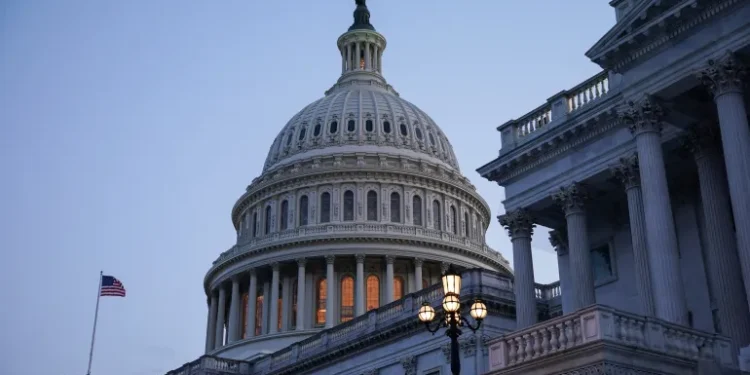The President of the Republic of Ghana, HE John Dramani Mahama, has inaugurated the Ghana Horticulture Expo 2025, an event he hailed as a testament to the nation’s immense agricultural promise and the indomitable spirit of its people.
Addressing a distinguished gathering, President Mahama articulated a visionary roadmap, asserting Ghana’s readiness not only to cultivate and export agricultural produce on a grand scale but also to spearhead Africa’s comprehensive agricultural transformation.
His address served as a powerful call to action, underlining the centrality of horticulture to Ghana’s economic future and its potential to unlock unprecedented prosperity.
The President commenced his speech by commending the architects of the Expo, singling out the Federation of Associations of Ghanaian Exporters (FAGE), the Ministry of Food and Agriculture, and Dr. Knezkofi Klugesen, whose “visionary leadership” and “lifelong dedication to youth empowerment, technology, and innovation” continue to illuminate Ghana’s path forward.

He also acknowledged individuals like Davis Kotoe for their comprehensive insights into the export sector and their unwavering advocacy for youth involvement, innovation, and exports, which have significantly influenced national discourse.
“Today’s expo reflects the advocacy, and our government’s response is anchored in action and commitment. I wish to assure you, you have my fullest support. As President, I firmly believe that the most urgent, inclusive, and transformative development must begin from the ground. Literally, from the farms, the greenhouses, the backyard gardens across Ghana”.
President of Ghana, HE John Dramani Mahama
Commitment to Economic Renewal
This conviction, President Mahama noted, underpins his administration’s commitment to engineering an economic renewal that is inherently productive, equitable, and sustainable, positioning agriculture and horticulture in particular, not as an ancillary sector but as the very core of Ghana’s national economic transformation and reconstruction.
Despite Ghana’s natural endowments—abundant sunshine, fertile soils, and hardworking farmers—which have already established the nation as a global leader in yam exports and a growing force in tropical fruits and vegetables, President Mahama conceded that potential must translate into performance and hope must yield concrete results.

He articulated the critical need for Ghana to transition from smallholder survival to international competitiveness and youth-driven enterprise.
“If you’ve come across this country from Keta to Komenda, from Techiman to Tamale, you will have seen what I’ve seen, that is the silent land of our farmers, cooperatives, our mothers hunched over tomato beds, and young people innovating with very little support.
“Yet, many cannot access cold storage or find fair markets, and a single failed season can erase years, many years of effort”.
President of Ghana, HE John Dramani Mahama
This, he asserted, is not merely a technical hurdle but a “moral imperative,” posing the poignant question: “Can the nation prosper if the very hands that feed it remain its most neglected?”
Feed Ghana
His government’s unequivocal answer, embodied by the Expo and its new policies, is a resounding “no.” In line with this renewed commitment, President Mahama proudly reaffirmed his government’s flagship initiative, “Feed Ghana,” slated to run from 2025 to 2028.
This program, he explained, operationalises the broader “agriculture for economic transformation agenda” and represents a bold, multi-pronged response to critical national issues, including rural unemployment, persistent food insecurity, and an over-reliance on imports.
Within the agricultural sector, President Mahama noted that “Feed Ghana” encompasses several strategic projects, including the “Vegetable Development Project”, which aims to scale greenhouse cultivation and foster institutional, competitive farming.
More so, the President added that the Smart Agriculture and Farmer Support Centres are designed to deliver essential mechanisation services, advanced irrigation techniques, climate-smart advisory, and modern digital extension services directly to farmers.
Also, the Agricultural Industrial Zones and Cold Chain Infrastructure are vital for significantly reducing post-harvest losses and enhancing Ghana’s export readiness.

Finally, President Mahama noted that the Agribusiness Youth Clinics are crucial platforms to equip the next generation of young Ghanaians with the requisite skills, capital, and mentorship for successful agribusiness ventures.
These interventions, the President stressed, are not mere promises but “policy realities” meticulously crafted to render Ghana’s horticulture sector investment-ready, inclusive, and globally competitive.
24-Hour Economy Policy
Further bolstering Ghana’s productive potential across all sectors, President Mahama unveiled a “game-changing strategy“—the 4-Hour Economy initiative, noting that the transformative policy would officially commence operations on July 1, 2025.
“This policy will provide a framework for continuous production, processing, and logistics in horticulture. It allows fresh goods like pineapples, mangoes, chillies and herbs to move swiftly from the field to ports to international shelves, minimising losses and maximising value.”
President of Ghana, HE John Dramani Mahama
To facilitate this seamless flow, the President revealed that the Ministry of Trade and Agribusiness and Industry, in collaboration with the Ministry of Transport, the Ghana Revenue Authority, the Ghana Ports and Harbours Authority, and the Ghana Shippers Authority, are diligently working towards declaring the Tema and Takoradi ports as 24-hour operational hubs.

He clarified that the 24-Hour policy extends beyond simply working longer hours; it entails the strategic development of crucial infrastructure, reliable energy supply, robust security, efficient transport networks, and sophisticated digital platforms, all designed to enable round-the-clock agro-industrial activity.
This initiative, he declared, is a “strategy of hope rooted in efficiency and scale,” vital for stabilising the national currency by significantly boosting foreign exchange earnings through high-value agricultural exports.
President Mahama highlighted Ghana’s impressive non-traditional export performance in 2024, which exceeded $3.5 billion, with horticulture playing a leading role.
He then set an ambitious target: to surpass $10 billion in non-traditional exports by 2030, a goal he confidently asserted was achievable.
From Aid to Trade
To realize this, Ghana must consciously transition “from aid to trade” and “from dependence to dominance” within the export value chain.
Leveraging the African Continental Free Trade Area (AfCFTA), which offers a single market of 1.4 billion people, the President noted that Ghana’s focus now aims to extend beyond merely trading more to producing more, with the nation positioned to lead this continental effort.
“We must not only trade more but also produce more, and Ghana must lead in this effort. Imagine if Liberia grew fresh ginger, Ghana processed these gingers, Kenya packaged them, and we exported them as one brand to Dubai. This is the African economic ecosystem we must build, integrate, make efficient, and product self-reliant.”
President of Ghana, HE John Dramani Mahama
Concluding his address with a powerful call to action, President Mahama urged Ghana’s development partners to invest in infrastructure, agri-tech, and skills, not as transient donors but as committed partners.
He challenged financial institutions to be bold, to derisk the agricultural sector, and to provide genuine capital support for agribusiness startups, emphasizing the critical role of Ghana Eximbank as a catalyst for export growth.
To the nation’s youth and women, he passionately declared that agriculture should not be viewed as a fallback option but as a conscious “occupation of choice,” one to be embraced, lived, and thrived in.

Finally, he implored the private sector to invest with vision, aligning with government initiatives to scale processing, certification, and export capacity.
The time for action, he stressed, is now. He invoked the timeless words of Ghana’s first President, Dr. Kwame Nkrumah, who in 1957 called upon the nation to “seek the political kingdom.”
Today, President Mahama adapted this profound sentiment, urging exporters and the entire nation to “seek a productive economy.” He envisioned “growing Ghana one crop, one field, one future at a time,” acknowledging farmers as the backbone of this renewal, and youth as the heartbeat of national ambition“.
With a confident and renewed spirit of partnership, President John Dramani Mahama officially declared the Ghana Agricultural Expo 2025 open, signalling Ghana’s readiness to be “open for business, green export-ready, and growing with purpose.”
READ ALSO: Gov’t Commits Prudent Use of Fuel Levy to Revitalise Ailing Power Sector


